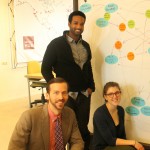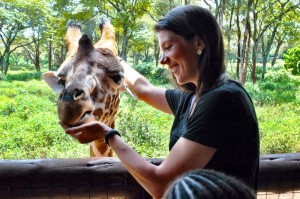
This post was submitted by MPA student and FMS alumna Nicole Manapol
Madelle Kangha may have just completed the FMS Training in June but this budding social entrepreneur (and aspiring leader of Cameroon) is already having a big impact on one of Africa’s most complex challenges – youth unemployment.
Since launching the JumpStart Academy Africa in 2013 with her Nigerian friend, Omotola Akinsola their venture has trained 220 young people from Cameroon and Nigeria in ethical leadership, civic engagement and entrepreneurship. JumpStart also provides employment opportunities to 30 young people.
One of their scholars from Ndu, Cameroon recently became one of 50 young people across Africa selected to join the inaugural class of the Yale Young African Scholars program. JumpStart Academy was also recently nominated for the Youth Citizen Entrepreneurship Competition, an international contest sponsored by the Goi Peace Foundation, Stiftung Entrepreneurship and UNESCO.
Madelle and her team have big impact goals – their plan is to reach 17,000 young people over the next 5 years.
In this interview Madelle talks about what led her to establish JumpStart and how the Frontier Market Scouts Program can help social entrepreneurs accelerate their impact.
Tell us a bit about your background – what led you to establish your own social venture?
Growing up amidst challenges in Cameroon lit a fire in me to create a more equitable society. I also benefited from strong role models, like my parents and siblings. This inspired my mantra and daily motto: “Setting the sky as your limit is overrated – Set the sky as your base. For in doing so, you soar to new heights and define the boundaries of what is possible.”
Beyond my personal experiences, I also had a very rich and unique education, which is at the core of my work as a social entrepreneur – especially with regards to Jumpstart Academy Africa. After 7 years in an allgirls boarding school, I learnt the possibility and value of female leadership in society. At the African Leadership Academy, I learnt firsthand how to design and implement solutions, business principles and new languages like Swahili.
During my time at the London School of Economics, I immersed myself in extracurricular activities such as helping pupils with their school work and raising their aspirations for higher education, running free law clinics, participating in Moot Courts, serving as Marketing Director for the LSE Entrepreneurs Society, Events Officer for the LSE Catholic Society, and study abroad with the LSE UN society at United Nations in Geneva, Switzerland.
Beyond academics, I was fortunate to undertake challenging internships and work experience programs with leading organizations such as Clifford Chance, Oliver Wyman, ICAP Plc, Standard Bank, Shearman and Sterling LLP and Teach First.
With these experiences, I set out to implement my ideas to create a better world; first with Youths4Change and then with Jumpstart Academy Africa.
What do you love most about your work?
My work as a social entrepreneur is all about creating value in a way that changes lives and advances society – this is what drives me.
I love that every day presents a new learning curve for me but my most important lesson has been managing the triple bottom line – People, Planet and Profit. My business can’t sustain itself without profits, and the world can’t be sustained without my business.
Managing multiple bottom lines can be a challenge but a combination of a well thought out model, a clear set of operating principles, deep passion and sufficient attraction of capital taken altogether, can allow a social entrepreneur to have both mission and margin.
Tell us about the JumpStart Academy – how did this all begin?
I enrolled at Watson University in 2013. It was at Watson that my path crossed with Omotola Akinsola, a groundbreaking changemaker from Nigeria. Aside from the fact that we both hope to someday lead our respective countries, we also had the same theory of social change – so we joined forces and Jumpstart Academy Africa was born.
The idea behind Jumpstart Academy Africa is simple using the principles of ethical leadership and entrepreneurship; students can learn the skills needed in today’s transformed and transitory world. Beyond acquiring skills, students receive training that enables them to innovate across different sectors – to be job creators as opposed to the old rhetoric of job seekers.
Why does this matter? Currently, Africa is the most youthful continent in the world. At least 35 per cent of its more than 1 billion population is between the ages of 15 and 35. Experts estimate this could double by 2045. Africa is home to the world’s fastest growing labor force, which by 2040, is expected to grow to 1.1 billion people. With an ever-increasing youthful population, the challenges are ever increasing, more complex and more urgent. Most pertinent is the fact that Africa is home to seven of the 10 fastest growing economies in the world, yet 70% of the workingage population is unemployed.
This means reaping the demographic dividend of Africa’s youthful population is not a given. It requires immediate and urgent substantial investment. Africa’s largely youthful population makes up the next generation of workers, politicians, teachers, parents, entrepreneurs and leaders. I firmly believe that harnessing the untapped potential of Africa’s youthful population is key to achieving economic growth and prosperity for the continent.
At Jumpstart Academy Africa, we are tackling this challenge via Leadership and Entrepreneurship. The model is simple. JumpStart Academy delivers a two-year Leadership and Entrepreneurship curriculum to students aged 15 – 18 across partner secondary schools, through trained university students and graduates. Currently, we serve over 220 students in 15 schools across Cameroon and Nigeria. Ourgoal is to reach over 17,000 young people across 10 countries in the next 5 years.
Tell us about your FMS Experience – how did you first learn of the program and what were the most valuable aspects of the training for you?
I first learnt about FMS at the Net Impact conference in San Francisco last year where I was fortunate to meet Yuwei Shi – the founding director of the FMS program and Dean of the Graduate School of International Policy and Management at the Monterey Institute of International Studies. He told me about the program and encouraged me to apply. Less than a year later I was attending the June training in Monterey.
My FMS Experience was great. I was impressed with the caliber of the fellows, the mentors and trainers. The content of the training was very well tailored and relevant to my work with the JumpStart Academy. I particularly liked Ross Baird’s session on the Fit Framework, which looks at the Investor’s perspective in the Social Impact Space. This has been a very useful tool as it gives me insight as a social entrepreneur into what investors are looking for when considering whether or not to fund a venture.
As a social entrepreneur the training is invigorating – you get to bounce ideas off of others working in the space, collaborate and in my case – recruit talent for my enterprise!
Any advice for other aspiring social entrepreneurs?
Yes – Fail often to succeed sooner!!!
Learn more about the JumpStart Academy and how to get involved: www.jsaafrica.org
Vote for the JumpStart Academy Africa in the Youth Citizen Entrepreneurship Competition
Keep up with Madelle and other fellows at http://www.miis.edu/academics/short/frontier-market-scouts/fellows/currentfellows
For more information, visit www.fmscouts.org. Read our blog at blogs.miis.edu/frontier/. Follow us on Twitter @FMScouts and on Facebook at facebook.com/frontiermarketscouts.



